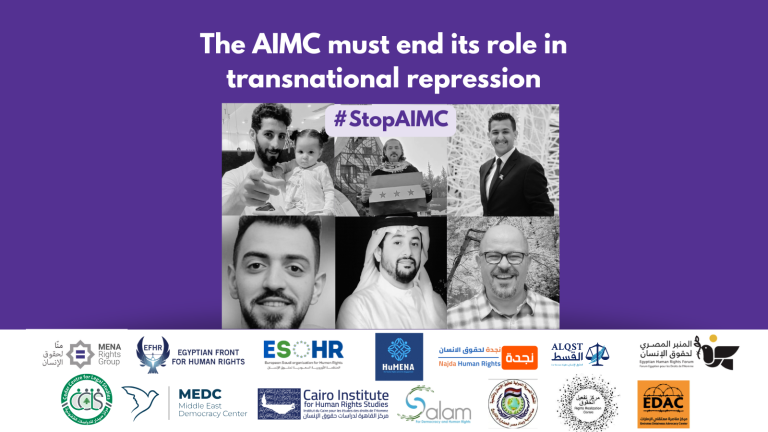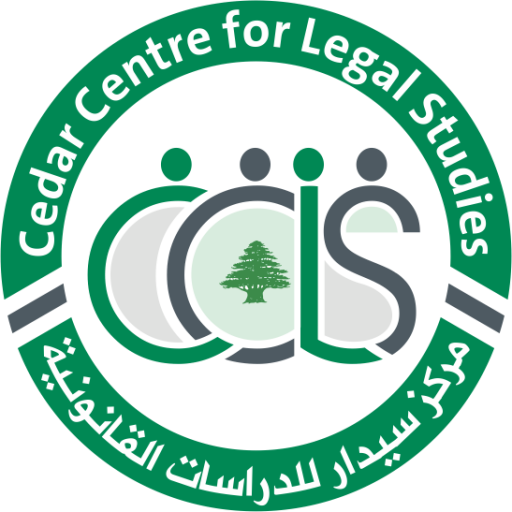Cedar Centre For Legal Studies
Statement
The AIMC must end its role in transnational repression, say NGOs
17/02/2025

17/02/2025
The undersigned organisations call on the Arab Interior Ministers’ Council (AIMC) to cease its facilitation of arbitrary extraditions of peaceful dissidents and human rights defenders across Arab League countries and to align its legal framework and systems with international human rights law.
On Sunday, February 16, 2025, the AIMC held its 42nd annual conference in its headquarters in Tunis. Often misleadingly referred to as “Arab INTERPOL”, the AIMC is an Arab League body tasked with enhancing cooperation among Arab states in the fields of internal security and crime prevention. Through its Department of Criminal Prosecution and Data, the AIMC circulates state-requested warrants to liaison divisions in Member States and facilitates wanted individuals’ extradition.
The conference took place amidst a rise in transnational repression, i.e. the targeting of peaceful dissidents, protesters and human rights activists travelling to Arab League states or living in exile.
Although extraditions for “crimes of a political nature” are explicitly prohibited by the AIMC’s legal framework, specifically article 41 of the Riyadh Arab Agreement for Judicial Cooperation, they still occur in practice. Lacking an oversight body to prevent the abuse of its systems, the AIMC has become the perfect tool for Arab League states to request politically motivated extraditions.
Between 2022 and 2025, MENA Rights Group has documented the unlawful extraditions of four individuals: Khalaf al-Romaithi, Hassan al-Rabea, Salman al-Khaldy, and Abdulrahman al-Qaradawi. Currently, one individual is facing an imminent risk of extradition: Ahmed Kamel.
Ahmed Kamel is an Egyptian national currently detained in Saudi Arabia, where he had been living for a decade. In reprisal for peacefully protesting during the Arab Spring in Cairo in 2011 and 2014, Kamel faces imminent extradition to Egypt, where he may be subjected to human rights abuses including torture.
Despite their prohibition, Arab states continue to request and fulfil politically motivated extraditions, weaponising domestic laws which conflate peaceful criticism and human rights activism with terrorism or threats to state security.
Furthermore, the AIMC’s legal framework makes no reference to international human rights standards. More specifically, it fails to mention the principle of non-refoulement, enshrined in article 3 of the UN Convention against Torture, which provides that individuals must not be extradited to a country where they would face torture.
UN Special Procedures mandate holders have raised concerns over the AIMC’s operations in a communication addressed to the Arab League, notably raising the impossibility for individuals to access their criminal file and challenge their arrest warrant. However, the UN experts have been provided with no response, and the Council has yet to undertake any reform.
As the AIMC continues to facilitate grave human rights violations across the Arab region, substantial change is required to ensure peaceful dissidents and human rights defenders are not at risk of transnational repression.
The undersigned organisations therefore urge the AIMC to immediately halt its facilitation of politically motivated extraditions, and undertake urgent reforms, in consultation with civil society, to align its legal framework and systems with international human rights law.
*Individuals who have faced extradition based on an AIMC warrant include, from most to least recent:
- Turkish-Egyptian poetAbdulrahman al-Qaradawi, who was extradited from Lebanon to the United Arab Emirates (UAE) in January 2025. A prominent voice of the Arab Spring, al-Qaradawi was targeted by an AIMC warrant in reprisal for posting a video notably criticising the Egyptian and Emirati authorities during a trip to Damascus. Since his unlawful extradition to the UAE, his fate and whereabouts remain unknown.
- Kuwaiti activist and government criticSalman al-Khaldy, who was also extradited in January 2025 from Iraq to Kuwait following an AIMC warrant. His country of origin had sentenced al-Khaldy to lengthy prison terms and stripped him of his citizenship in retaliation for his critical social media posts and participation in peaceful protests.
- Emirati peaceful political opponent and member of the UAE94 and UAE84Khalaf al-Romaithi, who was extradited outside any judicial process in May 2023 from Jordan to the UAE, where he remains forcibly disappeared to this day.
- Hassan al-Rabea, a Saudi national from the Shi’a minority, who faced a similar fate when he was swiftly extradited from Morocco to Saudi Arabia in February 2023, following an arrest warrant circulated by the AIMC despite clear risks of torture in his country of origin. He currently remains in prison in Saudi Arabia.
- S.-Egyptian political satiristSherif Osman, who was arrested in the UAE following a warrant circulated by the AIMC in November 2022, and risked being extradited to Egypt. After strong international advocacy and given his status as an American citizen, he was ultimately able to return to the United States after almost two months in detention.
Signatories:
MENA Rights Group
Egyptian Front for Human Rights
ESOHR
Cedar Centre for Legal Studies
Law and Democracy Support Foundation – LDSF
Middle East Democracy Center (MEDC)
ALQST for Human Rights
Egyptian Human Rights Forum ( EHRF)
Rights Realization Centre / مركز تفعيل الحقوق
Salam for Democracy and Human Rights
Najda for Human Rights
Emirates Detainees Advocacy Center (EDAC)
HuMENA for Human Rights and Civic Engagement
